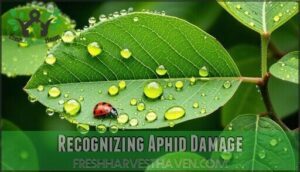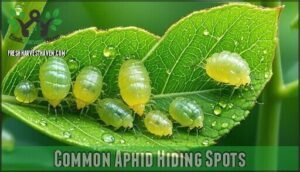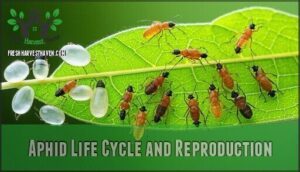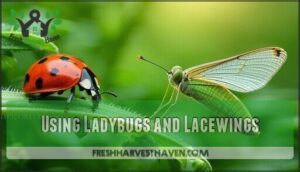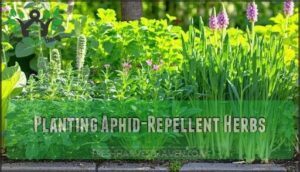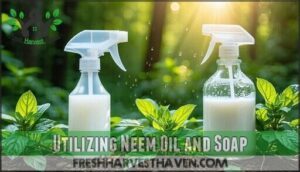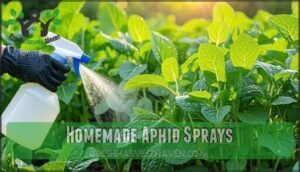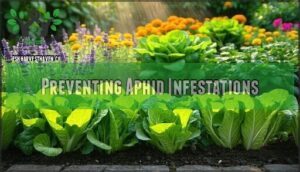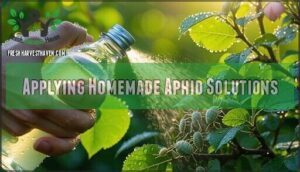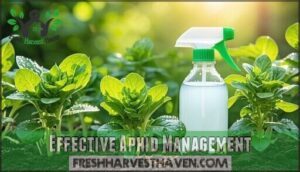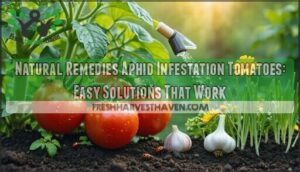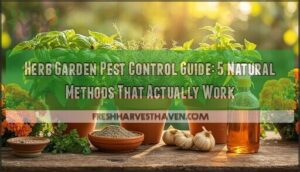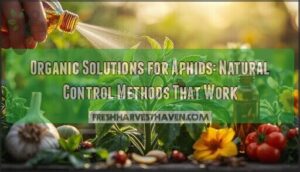This site is supported by our readers. We may earn a commission, at no cost to you, if you purchase through links.
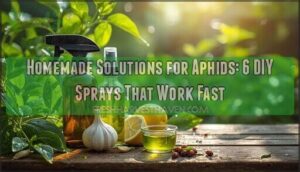
Soap and water sprays suffocate these soft-bodied pests on contact, while vinegar-based mixtures dehydrate them effectively.
Neem oil disrupts their feeding and reproduction cycles, and garlic oil creates protective barriers that repel future invasions.
These DIY treatments work just as well as expensive commercial sprays – ladybugs consume up to 5,000 aphids in their lifetime, but your homemade arsenal gives you immediate control.
The secret lies in understanding which ingredients target specific aphid vulnerabilities and when to apply them for maximum impact.
Table Of Contents
- Key Takeaways
- Identifying Aphid Infestations
- Natural Aphid Control Methods
- Homemade Aphid Sprays
- Preventing Aphid Infestations
- Applying Homemade Aphid Solutions
- Effective Aphid Management
- Frequently Asked Questions (FAQs)
- What is the best homemade solution for aphids?
- How do I get rid of aphids asap?
- Do banana peels really work for killing aphids?
- Does vinegar really kill aphids?
- Is vinegar or soap better for aphids?
- Can aphids infect other garden plants nearby?
- How often should I inspect for aphids?
- Are aphid eggs visible to the naked eye?
- Can aphids survive extreme weather conditions?
- Do aphids carry diseases to humans directly?
- Conclusion
Key Takeaways
- You’ll eliminate aphids instantly with soap-and-water spray (1 tablespoon dish soap per quart water) that suffocates them on contact without harming beneficial insects.
- You can prevent infestations by maintaining healthy plant growth through proper watering, avoiding over-fertilization with nitrogen, and using companion planting with garlic and marigolds.
- You’ll get maximum effectiveness by combining multiple methods—rotate between soap spray, vinegar mixtures, neem oil, and garlic spray to prevent resistance buildup.
- You need to apply treatments during early morning or evening hours when temperatures stay below 75°F to avoid leaf burn and protect beneficial insects.
Identifying Aphid Infestations
You’ll spot aphid infestations early by checking for sticky honeydew residue, yellowing leaves, and clusters of tiny green or black insects on leaf undersides and new growth.
These soft-bodied pests reproduce rapidly, completing their life cycle in just 3-4 weeks, which means small problems can explode into major infestations before you realize what’s happening, and this can lead to significant issues with rapid reproduction.
Tiny aphids multiply so fast they can double weekly – catch them early or watch your garden vanish!
Recognizing Aphid Damage
Recognizing aphid damage starts with spotting the telltale signs before these tiny invaders overwhelm your plants. You’ll notice aphid signs like sticky honeydew coating leaves, creating a glossy film that attracts black sooty mold. Plant symptoms escalate quickly—leaves curl, yellow, and feel tacky to touch.
Key aphid damage indicators include:
- Leaf damage with curling, yellowing, or dropping foliage
- Sticky honeydew residue on stems and leaves
- Stunted plant growth with wilted shoots and failed buds
Infestation rates climb rapidly since aphids reproduce without mating, doubling populations weekly. During your garden inspection, check tender new growth where these pests cluster most heavily. Early detection prevents leaf burn and permanent damage to your plants’ vascular system.
Common Aphid Hiding Spots
Once you’ve spotted the damage, you’ll need to become a detective and hunt down where these sneaky pests are actually hiding. Aphids aren’t just randomly scattered—they have preferred real estate that offers protection and easy access to their favorite plant juices.
Check these prime aphid hiding spots during your garden inspections:
- Leaf undersides: Flip leaves over to find clusters of aphids and their eggs tucked away from predators
- New growth and stem tips: Examine tender shoots where aphids congregate to feed on nutrient-rich sap
- Hidden crevices near soil pockets: Look around stem bases and leaf joints where aphids shelter from weather
Finding these aphid infestations early makes your homemade aphid spray treatments far more effective for complete aphid removal. Understanding aphid life cycles is essential for effective eradication methods.
Aphid Life Cycle and Reproduction
Now that you’ve found aphids lurking in their favorite spots, you’ll quickly realize why timing matters so much in your battle plan.
The aphid life cycle races through completion in just 3-4 weeks under ideal conditions.
Aphids multiply like garden fire – one female creates an army in just 3-4 weeks
The female aphids don’t waste time with courtship rituals – they skip mating entirely through a process called parthenogenesis.
This means one pregnant female can single-handedly launch an invasion.
Aphid eggs hatch into tiny nymphs that immediately start feeding and growing.
These young aphids go through several life stages, molting their skin as they outgrow it.
Rapid reproduction kicks into overdrive when temperatures climb above 60°F.
Here’s the kicker: aphid birth happens live in many species.
Females produce 3-6 offspring daily for weeks.
Aphid growth accelerates so fast that populations can double weekly under perfect conditions.
This explosive aphid reproduction cycle explains why your homemade sprays work best when applied early and often.
Natural Aphid Control Methods
You can tackle aphid problems effectively without harsh chemicals by using nature’s own pest control army.
Beneficial insects like ladybugs and lacewings will devour aphids while companion plants and natural oil treatments create an unwelcoming environment that keeps these plant-sucking pests at bay, utilizing nature’s own mechanisms to control them.
Using Ladybugs and Lacewings
Why trust nature’s tiniest warriors when they’re your garden’s most effective aphid eliminators? Ladybugs and lacewings deliver unmatched biological control, with single ladybugs consuming up to 5,000 aphids during their lifetime.
These natural predators offer superior organic aphid control methods without harmful chemicals.
Maximizing beneficial insect support:
- Release strategically – Deploy ladybugs during cool mornings when they won’t immediately disperse from your garden
- Create lacewing habitats – Plant nectar-rich flowers like dill and fennel to support beneficial insect populations
- Eliminate ant colonies – Ants farm aphids, disrupting your natural aphid control army’s effectiveness
Understanding ladybug trap systems guarantees optimal predator retention and sustained aphid suppression. By promoting natural pest control, gardeners can create a balanced ecosystem that fosters healthy plant growth.
Planting Aphid-Repellent Herbs
Transform your garden into an aphid-free fortress by strategically planting fragrant herbs that act as natural barriers.
Oregano, chives, and garlic create powerful organic defense systems through their strong scents, which aphids can’t tolerate. These pest repellent herbs serve double duty—protecting your plants while providing fresh ingredients for your kitchen.
Aphid Repellent Herbs Garden Benefits
Plant these natural pesticide champions around vulnerable crops to establish protective zones that beneficial insects appreciate but aphids avoid.
Utilizing Neem Oil and Soap
Neem oil disrupts aphid reproduction while soap ingredients help the mixture cling to plant surfaces. This natural pesticide combination provides effective aphid repellent action without harming beneficial insects.
- Mix 2 teaspoons neem oil with 1 teaspoon mild dish soap
- Add to 1 quart warm water in spray bottle
- Shake vigorously to create proper emulsion
- Test neem oil spray on single leaf first
- Apply homemade aphid spray every 7-10 days for best results
Homemade Aphid Sprays
You’ll find that creating your own aphid sprays gives you complete control over what goes on your plants while saving money.
These homemade solutions work just as effectively as store-bought options, often targeting aphids within hours of application, providing a complete and efficient way to manage pests.
Soap and Water Solution
The simple soap solution stands as your first line of defense against aphid invasions. Mix 1-2 teaspoons of liquid dish soap with one quart of water for effective Soap Preparation with the right Water Ratio.
This homemade aphid spray works by suffocating aphids on contact, making it a reliable natural pest control method.
Step Details Tips
Mix 1-2 tsp dish soap + 1 quart water Use mild, fragrance-free soap
Apply Spray all plant surfaces Focus on leaf undersides
Target Direct contact with aphids Reapply after rain
Master your Spray Technique by coating affected areas thoroughly. This dish soap spray provides excellent Solution Efficacy while remaining gentle on plants, making it ideal for regular Aphid Removal in your aphid control methods arsenal.
For effective results, understanding aphid control soap is vital in managing aphid populations effectively.
Vinegar and Castile Soap Spray
While soap and water provide solid results, vinegar spray with Castile soap delivers even more powerful aphid control.
This combination creates a dual-action natural pesticide that’s tough on pests but gentle on your garden.
Here’s why this homemade aphid spray works so well:
- Acetic acid dehydrates soft aphid tissues, causing up to 80% mortality within 24 hours
- Castile soap suffocates aphids by breaking surface tension and coating their bodies
- Combined action disrupts the waxy protective coating, doubling mortality rates compared to water alone
Mix 1 tablespoon each of white vinegar and Castile soap per quart of water.
Spray directly onto affected areas, especially leaf undersides where aphids cluster.
Reapply every 5-7 days for continued control.
Understanding natural aphid control methods is essential for maintaining a healthy garden ecosystem.
Neem Oil and Dish Soap Mixture
Creating natural pesticides with neem oil gives you powerful aphid control methods.
Mix 2 teaspoons neem oil with 1 teaspoon dish soap in 1 quart water for proper oil emulsification.
This homemade aphid spray disrupts feeding and reproduction while the dish soap ratio guarantees penetration.
Apply weekly to maintain dish soap effectiveness against stubborn colonies in your organic gardening routine.
Garlic and Mineral Oil Spray
Garlic oil spray packs a powerful punch against aphids when you mix crushed garlic with mineral oil, water, and dish soap.
This homemade insecticide creates an effective oil emulsion that disrupts aphid feeding patterns.
Apply weekly, adjusting garlic concentration based on plant sensitivity, and monitor application frequency to avoid overwhelming delicate foliage.
Store your natural pest control solution in cool, dark conditions, and Find garlic oil products online to maximize aphid control methods.
Preventing Aphid Infestations
The best defense against aphids starts with prevention rather than treatment after they’ve already established colonies on your plants.
You can create an environment that naturally discourages these pests by maintaining healthy plant growth, using proper fertilization practices, and implementing strategic companion planting techniques.
Maintaining Healthy Plant Growth
When your plants thrive, aphids struggle to gain a foothold. Soil Health forms the foundation—rich, well-draining earth supports robust growth that naturally resists pest invasions. Think of healthy plants as having their own security system.
Essential maintenance practices include:
- Proper Watering: Deep, infrequent watering strengthens root systems
- Sunlight Exposure: Adequate light promotes vigorous growth and natural defenses
- Air Circulation: Good spacing prevents humidity that attracts pests
- Pruning Techniques: Remove weak growth before aphids find it
- Balanced nutrition without excess nitrogen that creates tender shoots
To combat infestations, consider introducing beneficial insects like ladybugs to your garden. Strong plants make your homemade insecticide and natural pest control efforts far more effective, creating the perfect partnership for organic gardening tips success.
Avoiding Over-Fertilization
With over-fertilization creating a nutrient imbalance, you’ll turn your garden into an aphid magnet.
Excessive nitrogen promotes tender growth that aphids love. Regular soil testing prevents this common mistake.
One method for eradicating aphids naturally involves using isopropyl alcohol spray on affected plants.
| Fertilizer Types | Aphid Control Methods |
|---|---|
| High-nitrogen synthetic | Attracts aphid infestation |
| Slow release organic | Prevents pest problems |
| Balanced organic options | Supports natural defenses |
Choose organic gardening tips that emphasize slow-release formulas. These organic pest control garden pest solutions maintain steady growth without creating vulnerable plants that invite trouble.
Using Reflective Mulch and Companion Planting
Reflective mulch acts like nature’s confusion tactic, bouncing light upward to disorient aphids before they land.
Silver or aluminum mulch creates pest confusion through mulch reflection, while companion planting with marigolds and herbs builds your garden ecosystem’s natural defenses.
These planting strategies combine companion benefits with aphid repellent properties for effective natural pest control and pest prevention.
Applying Homemade Aphid Solutions
You’ll get the best results from your homemade aphid sprays when you apply them at the right time and avoid harsh conditions.
Apply these DIY solutions during early morning or late evening hours when temperatures are cooler and beneficial insects are less active, which is the best time to ensure effectiveness.
Spray Application and Timing
Timing your spray application correctly transforms good intentions into garden victories. Apply homemade solutions during early morning or evening when temperatures stay below 75°F and winds remain calm. This optimal timing prevents leaf burn while ensuring maximum spray coverage.
Target these application windows for best results:
- Evening application after 6 PM when beneficial insects retreat
- Cool mornings before 9 AM when dew enhances solution strength
- Overcast days when weather conditions stay mild
- Every 3-5 days for consistent repeat applications
Test spray frequency on small leaf sections first, adjusting based on plant response and infestation severity.
Avoiding Midday Sun Exposure
Nobody wants to see their plants suffer from leaf scorch after applying homemade solutions.
Spray timing becomes critical because midday heat intensifies application risks and reduces solution effectiveness.
Plant sensitivity peaks during direct sunlight exposure, causing leaf burn instead of aphid control.
Choose early morning or evening for application techniques in indirect sunlight.
| Time Period | Temperature | Risk Level |
|---|---|---|
| Early Morning (6-9 AM) | Cool (60-75°F) | Low |
| Midday (11 AM-3 PM) | Hot (80-95°F) | High |
| Evening (5-8 PM) | Moderate (65-80°F) | Low |
Effective Aphid Management
Using multiple aphid control methods together creates the most effective defense against these persistent garden pests.
You’ll need to monitor your plants regularly and adjust your approach based on what you observe, since different infestations respond better to specific treatments, and this approach allows for a more effective defense.
Combining Multiple Control Methods
Through Integrated Pest Management, you’ll create Layered Defenses against aphids.
Start with beneficial insect support, then apply homemade pesticides weekly.
Use Rotating Solutions—neem oil one week, soap spray next.
This Comprehensive Approach prevents resistance while maintaining effective organic pest control.
Synergistic Control Methods work better than single treatments alone.
Monitoring Plant Health and Aphid Populations
Beyond just watching your plants, smart early detection requires systematic visual inspection twice weekly, focusing on new growth where aphid populations explode first.
Aphids cause damage through honeydew and sooty mold.
Population dynamics shift quickly – what looks manageable Monday becomes a colony by Friday.
Track these patterns:
- Growth stages matter: tender shoots attract more aphids than mature leaves
- Environmental factors like humidity and temperature influence aphid infestation rates and plant health responses
Adjusting Strategies for Optimal Results
Solution strength adjustments help your homemade aphid spray tackle persistent infestations effectively.
Monitor plant sensitivity while rotating between different natural aphid control methods to prevent resistance buildup.
Weather considerations affect timing—apply during cooler hours to avoid leaf burn.
| Issue | Immediate Fix | Long-term Strategy |
|---|---|---|
| Weak effectiveness | Increase soap concentration | Combine multiple pest control methods |
| Plant damage | Dilute solution by 25% | Test on small areas first |
| Aphid resistance | Switch to different spray | Rotate aphid treatment options weekly |
Your aphid control methods work best when you adapt to what your garden tells you through results.
Frequently Asked Questions (FAQs)
What is the best homemade solution for aphids?
Tiny green invaders can destroy your garden overnight, but you’ve got a secret weapon in your kitchen.
Mix one tablespoon dish soap with one quart water—this simple solution suffocates aphids on contact while staying safe for beneficial insects.
This solution is a simple way to protect your garden.
How do I get rid of aphids asap?
Spray aphids directly with soapy water (1 tablespoon dish soap per quart water) for instant knockout. You’ll suffocate them on contact, then rinse plants after thirty minutes to prevent leaf damage.
Do banana peels really work for killing aphids?
Banana peels don’t directly kill aphids through contact. However, you can bury chopped peels around plants to add potassium and attract beneficial predators that’ll hunt aphids naturally.
Does vinegar really kill aphids?
Like acid rain on tender leaves, vinegar does pack a punch against aphids.
You’ll find that diluted white vinegar disrupts their colonies effectively, but it’s lethal to beneficial insects too, so use it sparingly and strategically.
Is vinegar or soap better for aphids?
Soap works better than vinegar for aphids because it suffocates them instantly while being gentler on plants. You’ll get faster results without risking leaf damage that vinegar can cause.
Can aphids infect other garden plants nearby?
Aphids spread like wildfire through gardens, transmitting lethal viruses between plants and rapidly infesting nearby vegetation.
You’ll find these sap-sucking pests quickly colonize healthy plants, causing widespread yellowing, stunting, and potential crop failure across your entire garden space, which can lead to lethal consequences.
How often should I inspect for aphids?
You should inspect your plants weekly during growing season, checking leaf undersides and new growth where aphids cluster. Early detection prevents rapid reproduction cycles that complete in just 3-4 weeks.
Are aphid eggs visible to the naked eye?
Ironically, these tiny destroyers leave behind equally small calling cards you can spot.
You’ll see aphid eggs as small, oval-shaped specks on leaf undersides and stems—they’re visible but require close inspection to detect these future plant invaders, which are the future plant invaders.
Can aphids survive extreme weather conditions?
Most aphids can’t survive freezing temperatures, but you’ll find some species overwinter as eggs or in protected spots. They’re surprisingly resilient in mild weather, bouncing back quickly when conditions improve.
Do aphids carry diseases to humans directly?
While you might worry about contracting illnesses from garden pests, aphids don’t transmit diseases to humans directly.
These plant-sucking insects can’t bite or infect you with viruses they carry between plants, which is a complete concept in understanding the risk associated with aphids.
Conclusion
Why spend money on commercial pesticides when your kitchen holds the solution?
These homemade solutions for aphids deliver rapid results using ingredients you already own. The soap-and-water spray suffocates pests instantly, while vinegar mixtures dehydrate them within hours.
Neem oil disrupts their reproduction cycle, and garlic spray creates lasting protection. You’ll save money while achieving professional-grade results.
Combine multiple methods for maximum effectiveness, and watch your plants recover quickly from these persistent invaders, using a soap-and-water spray.
- https://www.onegoodthingbyjillee.com/2012/05/original-blue-dawn-its-not-just-for-dishes-anymore.html
- https://www.fantasticgardeners.co.uk/
- https://entomology.ca.uky.edu/ef103
- https://link.springer.com/article/10.1007/s10340-019-01089-6
- https://www.growbarato.net/blog/en/prepare-your-own-insecticide-with-vinegar-and-soap

